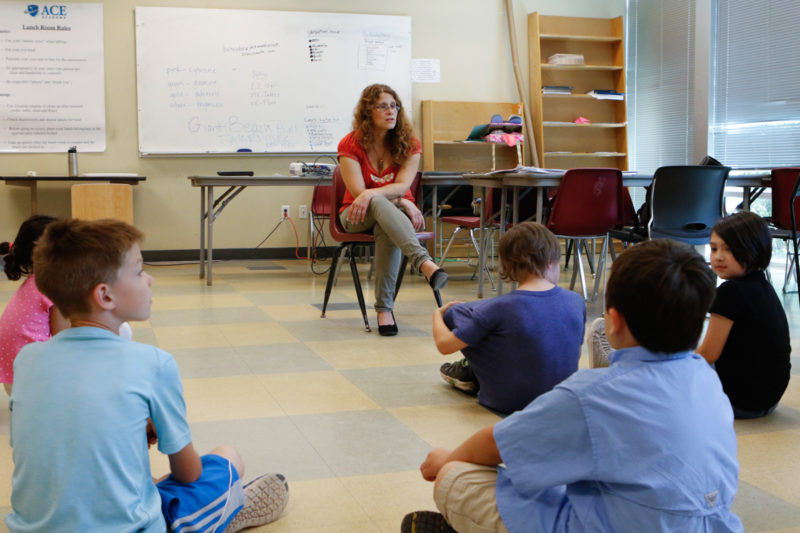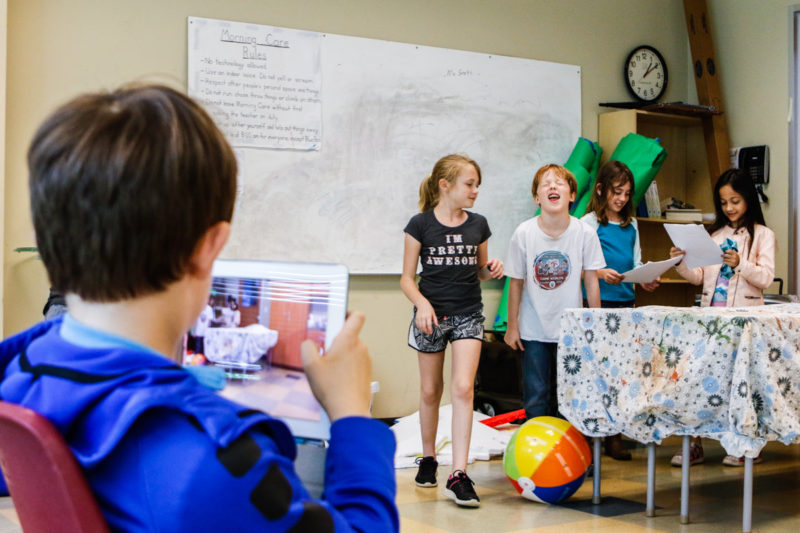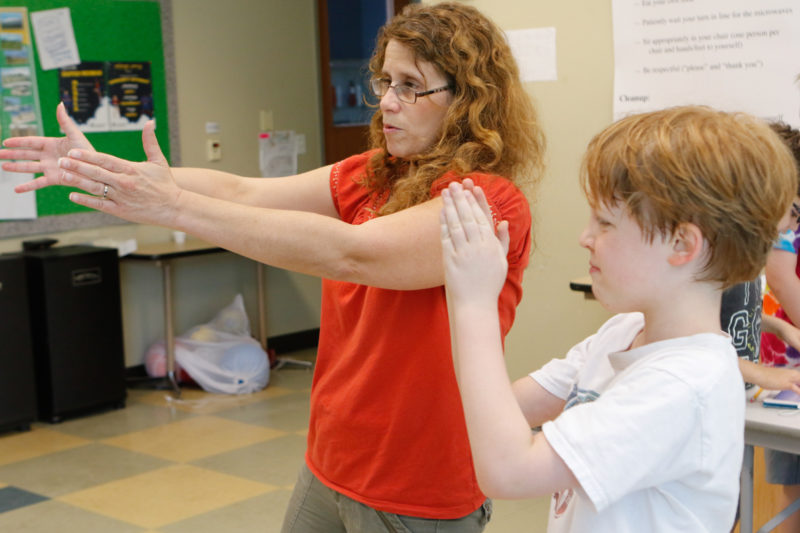Student, Parent, Teacher: She’s Seen All Sides of Gifted Education
By Yi Li
Photography By Denise Cathey
Reporting Texas

Bethany Rhoades asks students whether they would prefer to spend the class working on props or rehearsing the play they created at ACE Academy, a private school for gifted students in Austin. Denise Cathey/Reporting Texas
A woman in a long violet skirt, a blue vest over a billowy white shirt and a red floral crown is talking through a microphone on the playground. “Basket drums, who wants to try a basket drum?” she asks a group of elementary-age children. She wants them to join a drum circle at ACE Academy’s annual Shakespeare Festival.
Bethany Rhoades teaches theater at ACE Academy, a private, independent school for gifted students in Austin. This is her third year at ACE, but she has dealt with gifted children much longer than that. She has two gifted sons and was a gifted child herself.
Gifted and talented students perform “at a remarkably high level of accomplishment when compared to others of the same age, experience, or environment,” according to the Texas Education Code. Many Texas school districts offer special instruction for gifted children, but some parents choose to send their kids to private schools that serve only gifted children. Balancing the children’s educational and social needs is a continuing challenge for many parents.
Rhoades got into the gifted program at her elementary school in California when she was in second grade and spent almost all of her school years in a separate classroom with another 20 gifted learners. “We were always doing more than my friends in any other classes. We always had more ambitious projects,” Rhoades recalled.
She still felt the course wasn’t challenging enough for her. “I kind of wish my parents and the school had pushed me a little bit more. I should have taken it more seriously,” she said. Like many other gifted children, she got bored in classes and did the bare minimum to get into her dream school, the University of California, Irvine, with a 4.0 GPA.
School districts in Texas are not required to educate gifted children separately from their non-gifted schoolmates.
“Gifted kids need to be with other children, to support their emotional and social well being,” said Debi Torres, the gifted and talented coordinator for the Austin school district. “Beginning at the middle-school level, students who are advanced and/or labeled as gifted have the opportunity to take accelerated courses.”
Services differ from elementary school to elementary school. Less than half the public schools in Texas provide pull-out programs, where gifted children are educated apart from the rest of the school population for portions of the school day,
According to the 2015-16 Texas Academic Performance Report, 404,540 students, or 7.7 percent of total enrollment, were considered gifted.

Students have been writing, rehearsing, recording and editing their own movies since February. Here, Alexander Bain, 9, uses a tablet to record classmates Adelynn Harris, 9, Teddy Clements, 10, Alexandra Kimball,10, and Brielle Chandra, 9, as they perform a scene from Kimball’s script. Denise Cathey/Reporting Texas
Ten years ago, Rhoades and her husband, Matthew, a video game designer and a former gifted student, moved to Austin and had their first son, Orion.
By the age of 2, Orion was able to do math; by three, he was reading real books. Orion’s speech therapy teachers noticed that he was doing things other kids didn’t, so the Leander school district offered to have him tested for Asperger’s. The test result showed that Orion didn’t have Asperger’s but was profoundly gifted. Rhoades was told that once her son got to kindergarten age, public schools wouldn’t work for him. He would be doing third- or fourth-grade work by then.
“They can’t put a 5-year-old in that level classroom,” Rhoades said.
Frustrated that his public school couldn’t accommodate Orion’s needs, Rhoades put him in ACE Academy, which offers full-time instruction specifically designed for the gifted learner. ACE has 117 students, and it does not observe traditional grade levels. Students take a set of core classes and can choose among several electives, and they are encouraged to dig deeply into subjects that interest them. Tuition is $14,999 per year.
Rhoades’s younger son, Atticus, 8, was ready for higher level math after just two months in his public school’s first-grade gifted program. At that time, Rhoades was a math teacher at ACE.
“Seeing what the kids were able to do here versus what they were able to do there [in public school] made the choice much easier,” she said. She transferred Atticus to ACE Academy in first grade. He now attends The Joule School, another private school for gifted leaners, which is significantly closer to their home.
Tabitha Molet, dean of faculty and academic programs at ACE, said in an email that the biggest reason parents choose ACE instead of public schools is its flexible curriculum. “Students aren’t limited to taking classes based on their ‘grade level.’ ”
Orion has finished middle school at ACE, where he felt accepted and developed tight friendships, he said. This semester, Orion and two teammates from ACE made it to the finals of the Texas Destination Imagination Tournament, where students from elementary to college age develop a solution to one of seven problems. Now, he is taking high school courses online and preparing to apply to the Massachusetts Institute of Technology in three or four years.
Although her two sons have left ACE, Rhoades still enjoys teaching there. She likes to be surprised by her students’ creativity as she teaches them about theater – Greek, commedia dell’arte and Shakespearean. Many of her pupils have perfectionist streaks, and she teaches them to experiment and live with mistakes.
On the playground, a dress-up relay race, where participants change costumes while heading toward the finish line, is about to begin. “Join the costume race! Rhoades yells. “Come on over, get some costumes.”

Rhoades shows student Teddy Clements, 10, the camera angle he should use to record a scene. Rhodes encourages her students to be as involved as possible in writing, acting, filming and editing their own movies. Denise Cathey/Reporting Texas